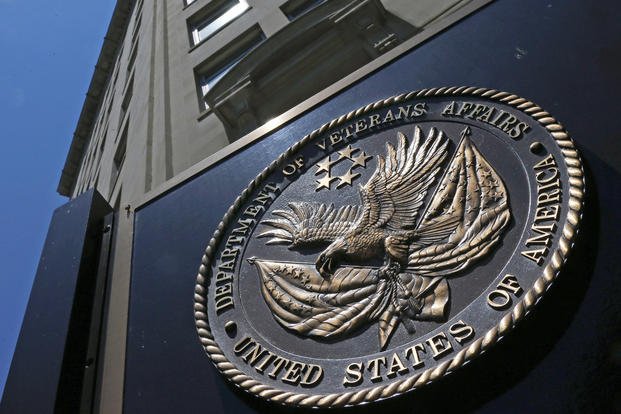The Department of Veterans Affairs paid senior executives at its headquarters $10.8 million in incentive bonuses last year -- funding meant to keep employees in critically understaffed positions -- and now it faces issues recouping the money, the department's top watchdog said in a report Thursday.
The amount is $1 million more than the department acknowledged last September when Secretary Denis McDonough said 170 senior executives at the VA's Central Office in Washington, D.C., erroneously received $9.7 million in bonuses under a retention bonus program authorized by the PACT Act.
The department inspector general's report found that 182 senior executives at VA headquarters received the nearly $11 million in bonuses, ranging in size from about $39,000 to more than $100,000 for each of seven executives in the Veterans Health Administration, or VHA.
Read Next: Florida Airman Was Shot by Deputy Within Seconds of Opening Apartment Door, Body Cam Footage Shows
According to the report, the under secretaries for health and benefits proceeded with the awards despite the concerns of the department's human resources officers and other staff.
VA Inspector General Michael Missal found that Under Secretary for Health Dr. Shereef Elnahal failed repeatedly to tell McDonough about the bonuses for VHA senior executives, while at the same time keeping him apprised of payments to field employees. His counterpart at the Veterans Benefits Administration, or VBA, Under Secretary Joshua Jacobs, provided McDonough memos describing plans to pay the bonuses -- known as critical skills incentives, or CSIs -- to senior executives at the headquarters, as well as field offices.
Elnahal approved 148 bonuses, while Jacobs signed off on 34.
"The OIG found the award of CSIs to nearly all VHA and VBA central office executives lacked adequate justification and was inconsistent with the PACT Act and VA policy. This was due, in part, to breakdowns in leadership and controls at multiple levels of VA," the report stated.
The PACT Act was signed in August 2022 to expand health care and benefits for millions of veterans sickened by exposure to burn pits and other environmental pollutants while serving overseas in support of U.S. operations.
The legislation authorized the VA to hire or provide incentives for employees in hard-to-fill posts, such as human resources, information technology, law enforcement and housekeeping, to ensure the department had sufficient staff to support the influx of veterans newly eligible for health care and benefits.
Under the legislative provisions, the VA has paid out more than $20 million in incentive payments to employees, including roughly half to the senior executives in its central office.
The inspector general noted that McDonough was not aware that nearly all VHA executives at the headquarters had been awarded bonuses until Sept. 13, when the VA's chief financial officer, Jon Rychalski, told him. The secretary announced a week later that the department would cancel the payments, recoup the money and have the inspector general investigate the matter.
At the time, VA Press Secretary Terrence Hayes said the department planned to work with executives to recoup the money, pledging to establish repayment schedules to ensure that no employees faced economic hardship as a result.
In its report, however, Missal said that clawing back the money presents a challenge, given that much of it already has been spent. Although an investigation into the recovery process was beyond the scope of the probe into the critical skills incentive bonuses, at least two senior executives retired from the Veterans Benefits Administration as a result, the report noted.
Emails between VA Chief of Staff Kimberly Jackson and Principal Deputy Under Secretary for Benefits Mike Frueh, obtained by Military.com through a Freedom of Information Act request, show the level of despondency and frustration felt by senior executives over the botched payments.
One senior executive said recoupment occurred without their awareness, "resulting in massive debt."
"I cannot express my frustration and disappointment enough. Having the CSI pulled was an issue, especially given the disparity between the treatment of [central office] staff and field leadership. That money had been a blessing initially, and earmarked to cover medical [expenses] which insurance doesn't cover. Instead, it has now become a curse," one senior executive, listed as [Senior Executive Service] 2, was quoted as saying.
"I don't mind when the organization makes mistakes, but what high-performing organization treats their employees this way?" asked another senior executive, [Senior Executive Service] 1, after noticing their paycheck had been docked to recoup taxes paid on the bonuses.
In the report, the inspector general made eight recommendations to officials, noting the department needed to resolve potential conflicts of interest and improve oversight of critical skills incentives and that McDonough should "take whatever administrative actions, if any, he deems appropriate related to the personnel involved."
In response, VA officials quibbled with the report's language but concurred with all eight recommendations. According to the VA's response, the department's Office of Accountability and Whistleblower Protection plans to work with the Office of General Counsel Ethics Specialty Team to determine whether disciplinary or nondisciplinary action will be taken against those involved.
The VA also will appoint officials to review critical skills incentive payments and examine the department's need for employees in high-demand jobs.
In a statement following the report's release Thursday, Hayes said critical skills incentive bonuses are "critical to retaining and hiring VA public servants, especially at a time when we're delivering more care and more benefits to more veterans."
"We will continue to work to ensure that everyone who receives a CSI meets the criteria to do so," Hayes said in an email. "We will make sure that we are utilizing it effectively, correctly, and as responsible stewards of taxpayer money."
VA officials announced Wednesday that Rychalski is leaving the department. They did not provide a reason for his departure, but said he is moving to another federal position.
Under Secretary for Memorial Affairs Matt Quinn announced earlier this month he will leave on May 23 after three years to spend more time with family.
Quinn is in charge of the third arm of the VA, the National Cemetery Administration, which did not award any critical skills incentives authorized under the PACT Act because officials "did not believe they had a justifiable reason to do so."
Hayes said the VA plans to revise and update its policies on bonuses to ensure that all future critical skills incentive benefits are "awarded appropriately."
"Secretary McDonough has made clear from the beginning that he takes responsibility. As soon as VA identified this error, we immediately took steps to address it -- and we reported the matter to the inspector general for review. We commit to veterans that we will learn from this error and fix it, as we have already begun to do," Hayes wrote in an email Thursday.
Related: VA Plans to Cut 10,000 Jobs This Year on Medical Side of the House













